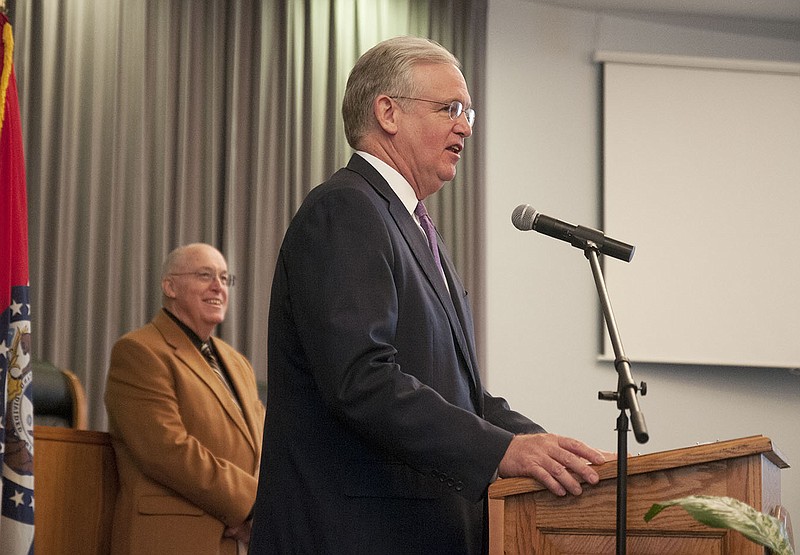Gov. Jay Nixon visited Fulton City Hall on Thursday to further stress the importance of building new facilities at the Fulton State Hospital and explain the way he wishes to fund it.
Marty Martin-Forman, FSH chief operating officer, said the governor's speech Thursday was a sign that a new Fulton State Hospital is closer to becoming a reality. She said plans for a new hospital have been drawn up previously in 1999 and 2008 with one other time in between those dates.
"We have never been this close," Martin-Forman said.
Nixon has proposed issuing $198 million in bonds for a new hospital. Nixon also said he would like to supplement $14 million to the 2014 budget and another $14 million for the 2015 budget, which will begin in July.
The $14 million distribution to the budgets, Nixon said, would get the project on a "fast track and get it moving now."
Nixon presented his proposals to the Missouri House and Senate budget committees earlier this week and said he is "very pleased" with the response, pointing out specific support from Senate President Pro Tem Tom Dempsey. He added that the Missouri Senate Committee on Capital Improvements issued FSH as a top priority in 2013.
Nixon stated that these "appropriated-back bonds" have been used by both parties in the past to accomplish capitol improvement projects such as the correctional facility in Bon Terre, metropolitan psychiatric facility in St. Louis and Truman State office building in Jefferson City.
He added the timing is fiscally appropriate with Missouri's AAA credit rating and low interest rates. As far as the general need for upgrades, Nixon said it's overdue.
"It's too important to wait any more," Nixon said. "I think everybody agrees this project needs to get done. This method of financing has been used a number of times in the state of Missouri for critical needs ... This is the most pressing need and we do not need to wait."
Representative Jeanie Riddle, R-Mokane, said FSH - the most dangerous place to work in Missouri - has been her No. 1 priority for the past five years and she is glad the issue is a high priority for the governor.
"It's a necessity. We cannot move this down the road any further," Riddle said. "It's a human rights issue for those who are employed there as well as those who are served, and it is the right opportunity for us to build this with fewer dollars spent."
She said she agrees with Nixon that "now is the time" - not only because of the Missouri's credit rating and low interest rates, but also because of the increased knowledge and awareness of Missouri's political officials of the dangers of the current facility. But Riddle said yesterday she's not entirely set on Nixon's plan to use bonds and would like more time to look into the budgeting.
"Since jobs are available, people are ready to go to work, the interest rate is low, I'm thinking this may be a better way to go," Riddle said. "We still have a little more homework to do, but right now that's the way I'm leaning."
Nixon faced criticism from some Columbia-based legislators regarding whether the funding was constitutional. The Fulton Sun reported in Thursday's edition ("Nixon to visit Fulton to promote bonding plan" on Page 1) that Senate Appropriations Chairman Kurt Schaefer, R-Columbia, stated he felt the governor's bonding plan is "extremely troublesome" after the state of the state address.
"We don't need to make excuses or up the political rhetoric," Nixon said. "That's not going to solve any problems. Harping about what didn't happen three years ago, looking in the rear view mirror here, is not going to build anything. We've got to look through the windshield and get going."
Riddle said she could not speak for the members of her party, but stated that it is the responsibility of lawmakers to analyze "every avenue" before spending taxpayer's money in all situations.
"I commend anybody who questions," Riddle said. "That's what we're supposed to do."
Nixon also stated that construction of a new FSH would bring jobs to the area, and an updated and safer facility would help the hospital's recruiting and training efforts. He said the hospital registered nursing staff is only two-thirds of what it should be, causing overtime and more stress on employees.
In addition to the outdated facility, a lack of technology can be a turn-off for recruited registered nurses, Martin-Forman said. She added that a registered nurse who has trained at St. Luke's Hospital in St. Louis may be deterred when visiting Fulton and the same technology is "nonexistant."
Martin-Forman said a new hospital design will be more therapeutic for clients and safer for staff and clients. The hospital's long and narrow hallways with short ceilings echo and aggravate clients and present dangerous situations to employees.
She has observed other mental health facilities in the nation and said innovations develop so quickly that FSH design plans from 2008 are now obsolete.
Martin-Forman's wish list for a new facility includes:
•Shorter hallways so employees can attend to patients more quickly,
•More windows to increase the amount of natural light,
•Computerized medical records,
•Bar codes on medicine,
•Scanning door locks to do away with using metal keys,
•Increased amount of beds.
There are 376 total beds in FSH, with three clients per room in Guhleman Forensic Center. A new facility for Biggs and its step-down program would total to about 300 beds. Biggs currently has 186.

